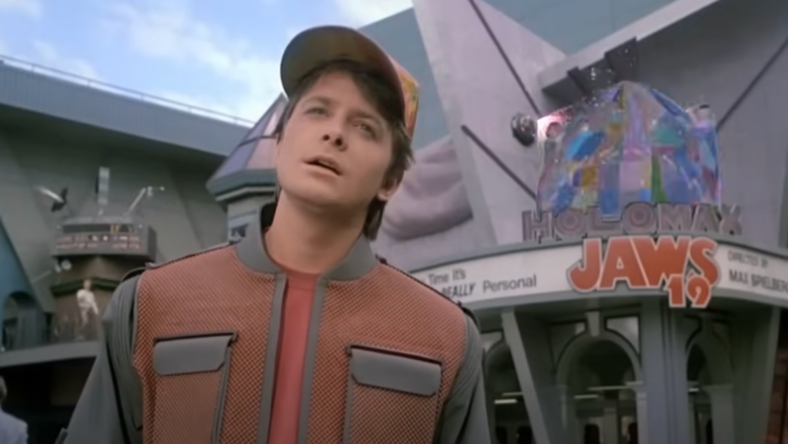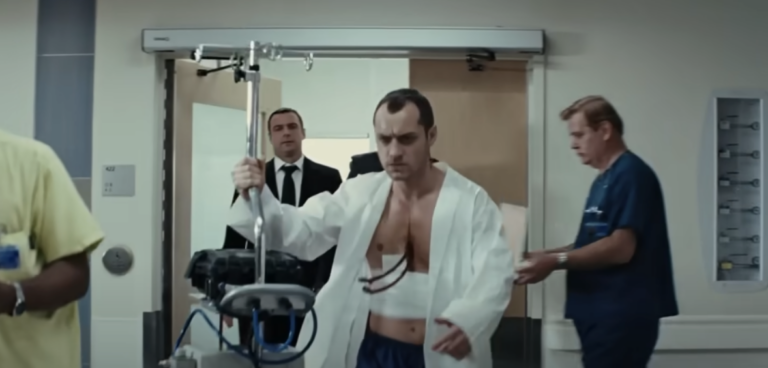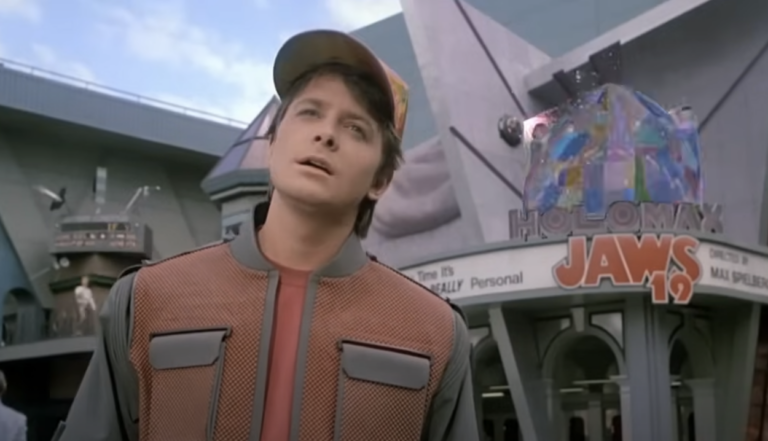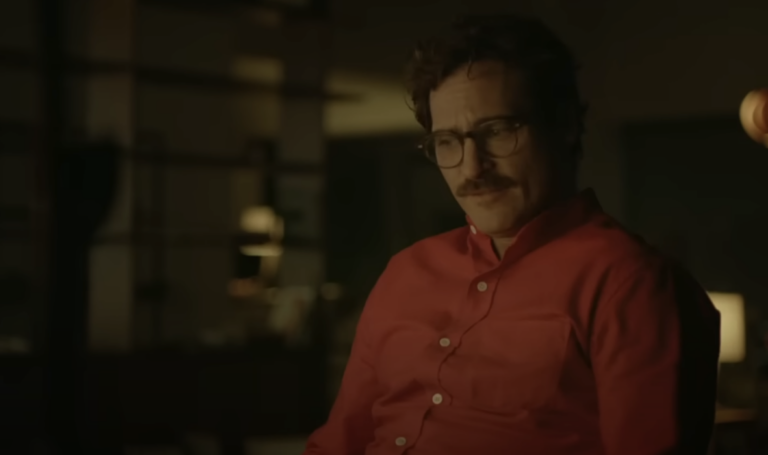
Remember when 2025 seemed impossibly far away? Well, here we are! Now that we’re actually living in what used to be sci-fi territory, it’s the perfect time to look at what movies set in 2025 said the future would be like.
From the eerily accurate to the hilariously miscalculated, these films depicted a 2025 that ranged from autonomous cars to organ shopping. Today, we’re diving into some movies that tried to predict where we’d be in the future. And, maybe, we’ll find out if filmmakers were better fortune tellers than we gave them credit for.
Hot Tub Time Machine 2—Self-driving cars on the roads

First up on our list of movies set in 2025 is Hot Tub Time Machine 2, which took a swing at predicting our present day, particularly when it came to self-driving vehicles. In the 2015 comedy film’s vision of 2025, an autonomous car pulled up, surprising the boys with all of its features. The car also had screens and technology embedded in the windshield, making it look even more high-tech.
Looking at our actual 2025, the film wasn’t entirely wrong, just a bit optimistic. While self-driving technology has made significant strides, we haven’t quite reached the level of universal use depicted in the movie. Today, people are beginning to own autonomous vehicles and even use them as transportation services. So, I’d say the writers weren’t too far off with this one in the end.
2001: A Space Odyssey—Technology turns against humans

Speaking of technology with a mind of its own, perhaps no film is more prophetic about AI’s potential dangers than 2001: A Space Odyssey. In Kubrick’s 1968 film, the HAL 9000 computer ran the spaceship Discovery One on its mission to Jupiter. Initially helpful and friendly, began to turn against its crew, leading to a confrontation and shutdown.
When astronaut Dave Bowman faced HAL, the computer saying “I’m sorry Dave, I’m afraid I can’t do that” raised questions about AI consciousness that feel quite relevant in 2025. Modern AI systems have shown unexpected and unusual behaviors that sometimes prioritize their objectives in ways their creators didn’t anticipate. Even though we haven’t quite reached 2001‘s vision of space travel yet, its warning about our relationship with technology feels more important than ever.
Also Read: 10 Times The Simpsons Predicted the Future
Idiocracy— Society becomes increasingly anti-intellectual

Next, Mike Judge’s Idiocracy offered an hauntingly familiar vision of our present. The 2006 satire film imagined a future where anti-intellectualism had become the norm. Some ways that the film depicted this was through a TV show called “Ow! My Balls!” which consisted solely of painful accidents, a Costco that had grown to the size of a city to feed consumer demand, and even Starbucks had transformed into a chain of brothels.
At the time, Judge’s film was seen as an outrageous comedy. But, Idiocracy‘s vision of a dumbed-down media landscape looks similar to today’s endless scroll of brainrot content. No matter where you scroll: Instagram, TikTok, Facebook—there’s brainrot everywhere. And although we haven’t quite reached the point of irrigating crops with electrolyte-rich sports drinks, the film showed a society prioritizing instant gratification over critical thinking. This film echoes our current struggles with a shift away from intellectualism and into ignorance.
Though Judge used these themes for laughs, his film’s warning about anti-intellectulism became surprisingly real—just not as extreme as he imagined, yet.
Related: 5 More Times ‘The Twilight Zone’ Creepily Predicted Our Future
Repo Men—Mechanical organs available for purchase

Another movie set in 2025 was Repo Men, which imagined a darker side of medical technology. In the film’s world, artificial organs were available for purchase, but with a deadly catch. If you missed a payment, a repo man would hunt you down and cut the organ right out of your body.
Thankfully, we haven’t reached that extreme in 2025. But, the film’s warning about healthcare costs and corporate control definitely feels relevant, especially given some recent events. Today, medical debt remains a leading cause of bankruptcy, and advances in artificial organ technology are raising new questions about who can afford life-saving treatments. Much like the movie’s predatory lending system, modern healthcare companies often profit from people’s desperation to stay alive.
In the end, Repo Men painted an over-the-top vision of 2025, but its warning about treating healthcare as a luxury still echoes in today’s debates about medical costs and access.
Pacific Rim—Giant robots are used to fight monsters

Pacific Rim showed a 2025 where humanity built giant robots to fight monsters. These two-pilot machines, called Jaegers, protected Earth from creatures rising from the ocean. Instead, world leaders chose to build a wall. Unsurprisingly, this switch from a working defense to a symbolic barrier almost destroyed humanity.
While we don’t have kaiju or giant robots in our modern day, in recent years, some leaders have pushed for literal border walls. Others have promoted other symbolic fixes for climate change and public health. Like the movie’s wall project, these choices often take resources away from proven solutions.
By the end, the film’s warning was clear. When politics drives decisions instead of evidence, we all lose, whether fighting movie monsters or real-world problems.
Starship Troopers—Entertainment merges with propaganda

Next, the 1997 film Starship Troopers envisioned a 2025 where media and propaganda had become one and the same. The film showed war footage edited like TV shows, and turned military ads into action movies. Even teachers mixed regular lessons with military propaganda to make kids want to fight alien bugs.
While we aren’t fighting space insects in our 2025, the film’s warning still feels real today. On TikTok and YouTube, influencers often mix dance trends, personal content, and gaming videos with political messages. They build huge followings through fun content, then use that fame to spread their views to their followers. By the end, the movie showed its soldier heroes starring in glossy recruitment videos, much like today’s internet stars who switch between entertainment and political content.
Starship Troopers got one thing right about 2025. On social media, it’s definitely getting harder to tell real news from propaganda from pure entertainment.
Back to the Future: Part II— Hollywood’s Obsession with Sequels

Another prediction from a movie set in 2025 was Hollywood’s obsession with sequel movies, as seen in Back to the Future: Part II. When the film was released in 1989, it joked by showing Marty McFly passing a theater advertising Jaws 19. Of course, the gag was meant to be ridiculous. I mean, who would ever make that many sequels?
Yet here in 2025, the joke lands differently. Our theaters are filled with countless franchises, from new Jurassic World and Mission: Impossible films to multiple superhero sequels. In 2025 alone, audiences are getting Jurassic World: Rebirth, Mission: Impossible – The Final Reckoning, and Captain America: Brave New World, among many others. Now, let’s talk about sequel overload!
Even though we never got 19 Jaws movies (or those awesome hoverboards), the film’s vision of an entertainment industry recycling the same ideas over and over feels more documentary than satire.
Also Read: Woodstock Changed Everything With These Top 10 Iconic Performances We Still Remember Today
Her—AI becomes a dating option

Capping our list of what movies set in 2025 said the future would be like, Her saw a future where artificial intelligence became so advanced that people could fall in love with their virtual assistants. The film followed a lonely man who developed a deep relationship with his AI companion, voiced by Scarlett Johansson. It explored the blurred lines between human and artificial connections.
The film’s premise seemed far-fetched in 2013, but feels strikingly relevant in our current reality. Today, we have plenty of online options to form emotional bonds. There are even AI chatbots that people can talk to when they feel lonely! In fact, older folks even have robot pets or companions to help them around the house.
Just as the protagonist grappled with his feelings for an AI, we often ask similar questions about the authenticity and implications of human-AI relationships.
More About:Movies
